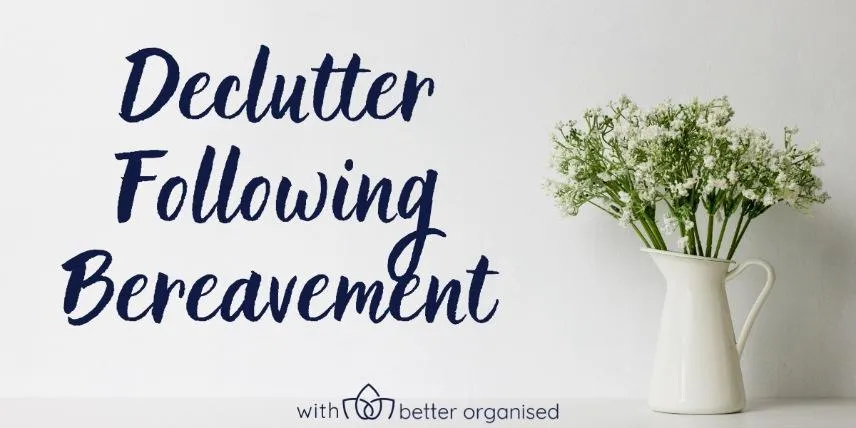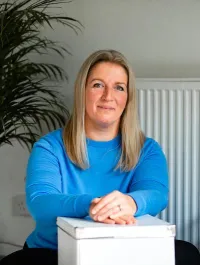BLOG
All the latest news, stories & advice.

Bereavement Decluttering
I know from personal and professional experience that dealing with a loved one’s belongings after they have passed away is likely to be one of the hardest things you’ll ever do.
The sheer enormity and responsibility of the task, coupled with the time, energy and emotion that it involves, can be simply overwhelming. Add to that family dynamics, the practical considerations about where to begin and decisions on what to do with precious belongings and you have a potentially complex situation that can be emotionally and physically draining.
Through my work as a professional organiser, I specialise in supporting families with this painful process by helping them to sift through a lifetime’s worth of possessions, facilitate decisions about what to do with everything, distribute items for auction, charity, recycling and disposal, and source appropriate storage solutions for items that are being kept.
Whether in-person or virtually (I sometimes work in UK properties for clients who are based overseas), I’ll sensitively deal with the hands-on elements as well as administrative requirements, liaising with other service providers and tradespeople and being a single point of contact for the sons, daughters or partners who are left behind after a loved one has passed away.
If you are currently dealing with this, here are some of my key pieces of advice:
Take your time. Decide if you are at a stage where you are physically and emotionally ready to start, and regularly check in with yourself to establish that the pace feels right, and that you are prepared to continue.
Identify the items that are non-negotiable. Selecting the belongings that absolutely must stay, and setting these to one side, is usually a simpler approach than starting from a position of what to discard. Asking family members to select the belongings they’d like to keep should be done before any donating or discarding takes place.
Choose easier categories first. Small categories that are less likely to have sentimental tripwires, such as tupperwares, stationery supplies or cleaning products, can be a good way to make early progress without being emotionally complicated.
Ask for help. I’ve seen first-hand how sharing the decluttering journey can make the whole process manageable and calm whilst maintaining a gentle momentum. Having someone to physically and emotionally support you can open up questions, help you with decisions and give a sense of perspective. Seeking professional advice can also help clarify practical matters, such as what paperwork needs to be kept or where to donate electrical items.
Be realistic about how and where you let go of items. Auction houses can be a good port of call for collectables or larger items. Selling belongings via local ads or online marketplaces might initially seem appealing and net you a small return but is a significant investment of your precious time and energy. It can be a particularly painful and challenging process to navigate where you have an emotional attachment to items. Perhaps select a charity or organisation that was meaningful to your loved one and donate items there instead.
Take photos. If there are a few items that you have decided to let go of, but that hold special memories, take some photos as a keepsake. Alternatively, consider whether you might already have photos of your loved one with the item, such as Grandad sitting at his beloved piano or Mum in one of her favourite winter coats, and put them in a frame or memory box (see below). This can be a lovely, respectful way to honour your loved one and treasure the memories of them enjoying these items whilst freeing up physical space. Passing the items on to worthy causes supports the important work that charities do and gives the item a new lease of life.
For items that you are keeping, I would encourage you to store items in such a way that they can be looked at, used and enjoyed, rather than tucked away in a loft where they never see the light of day. For example, I keep my granny’s sewing box (an upcycled Tiffany & Co. box which originally held a writing gift set that I had given her. It even has a label in her handwriting, which in itself is lovely to look at). I like using the supplies from time to time, and it is a simple, practical and personal reminder of her. I genuinely believe that using and enjoying these precious mementoes is a joyful way to celebrate a loved one.
Preserve the memories. Keeping a handful of keepsakes in a pretty storage box can be a lovely way to hold on to a few treasured items. This is ideal for items that are delicate or that you wouldn’t necessarily have on show i.e. letters, cards, pieces of jewellery that you wish to keep but won’t wear. There is something very special about having a physical connection with a loved one’s items, so filtering them down to the most precious ones which you can look at and touch can leave you with a manageable amount that can be looked at fondly. Perhaps include a bottle of their favourite scent, if you come across some when going through their toiletries, as the memories this can evoke will undoubtedly have a strong association with your loved one.
Try to not let guilt take over. I often hear people say that they would feel guilty about letting go of something that was important to their relative, but no-one wants their family burdened with everything they owned. Letting go is part of the grieving process and moving on from tangible memories doesn’t diminish your love or respect or mean that you miss the person any less. Aim to focus on a handful of things that bring the happiest memories, store them in a respectful way, and let go of the rest.
“Nostalgia is a powerful emotion but let it fill your heart, not your home”.
Juliet Landau-Pope
You are strong enough to face it all, even if it doesn’t feel like it right now.
Anon.
FREE INITIAL CONSULTATION!
Let's arrange a time to chat on the phone about your
goals and how I can help you to move forward.
© Copyright 2024 Better Organised - Privacy Policy - Terms & Conditions

